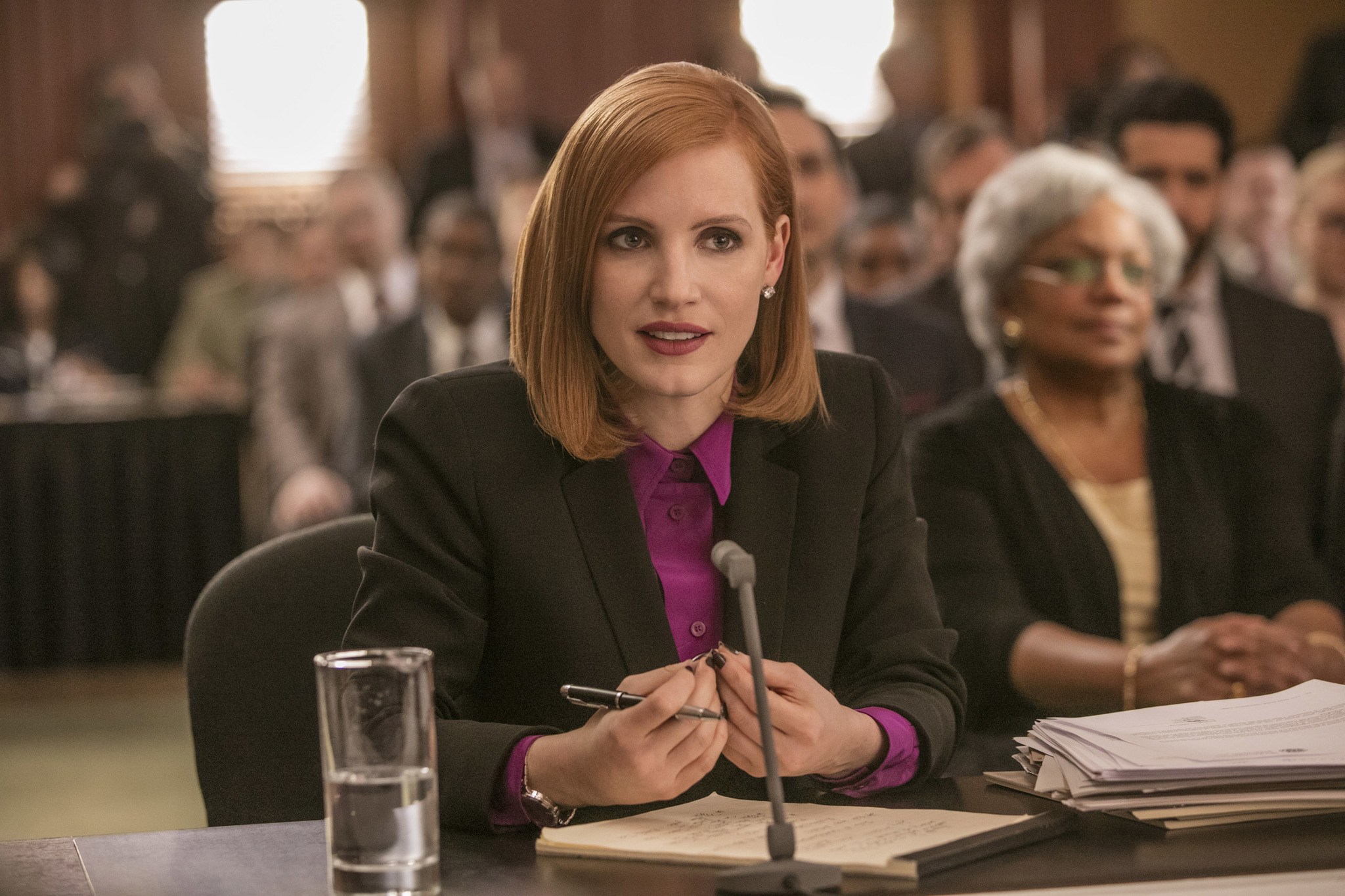At the heart of Miss Sloane—and a cool heart it is—lies a question. Why does the title character walk out on her lucrative career as one of D.C.’s highest-paid lobbyists to join an underfunded nonprofit in its quixotic attempt at changing some gun laws? The question keeps the movie from falling into the easy do-gooder outline of Erin Brockovich. Elizabeth Sloane (Jessica Chastain, all stiletto-heel precision) might possibly be stirred by a sense of social justice, but she might also just want to win a game that everybody tells her is unwinnable. We’re talking about an alpha female who isn’t content with mere victory—she gives you the impression she also wouldn’t mind hearing the lamentations of women (and men) on the field of battle. It’s crucial to this movie’s crisp watchability that we’re not sure what motivates her battle plan. Maybe battle is just her thing.
Miss Sloane has a fairly unbelievable screenplay by first-timer Jonathan Perera, starting with the idea that the U.S. Congress might address the regulation of certain kinds of ammunition. But believability is overrated, and it’s much more satisfying to let go of our plausibility needs and sit back to enjoy Miss Sloane’s near-supernatural powers of strategic anticipation. Her brain is so focused on how to lobby her cause, she doesn’t have room for anything else; even her sex life is well-ordered, being strictly a cash transaction (with a for-hire Texas stud played by Jake Lacy, from Obvious Child).
The movie is so caught up in Elizabeth’s forward motion that it doesn’t have time to explore the actual downside of her profession. There’s a reason one character calls her lobbyist job “the most morally bankrupt profession since faith-healing,” but the film wants to get on with plot, not scold its glamorous heroine. So her questionable methods are duly noted, especially at the beginning of the film, when she still works for the high-powered sharks. Even at her new job, we see her ruthless touch when it comes to an idealistic colleague (Gugu Mbatha-Raw, Beyond the Lights) and her brusque treatment of the guy (Mark Strong) who hires her for the impossible task. After a certain point her sheer authority holds sway over the movie, even when she’s being underhanded.
Perera ladles on the West Wing-style dialogue, which makes you wonder whether anybody in Washington, D.C., is tight-lipped. All of this is orchestrated by Shakespeare in Love director John Madden, who brings his customary breeziness to the work. The heavy lifting he leaves to Chastain. This is wise; the actress has a sobriety that helps the material stay as grounded as it ever gets. The timing of the film’s release is meant to set up Chastain for an Oscar nomination, and why not? She dominates Miss Sloane as few actresses get to dominate their films these days.
The title is unexplained, but surely it’s a reference to the condescension that Elizabeth has endured from the boys’ club all these years. There’s an early scene in which she sits down for a meeting with an important mucky-muck from the NRA, which wants to hire her to wage a campaign softening its image with women—“Guns as tools for female empowerment,” that kind of thing. In the middle of the meeting Elizabeth bursts out laughing, unable to contain herself at the idea of making guns cozy. This is very inappropriate—her boss (Sam Waterston) blanches, and the prospective client is none too happy. She’s not merely laughing at the NRA, she’s laughing at the boys’ club itself. It’s a fine moment for Chastain, who lets her derisive guffaws go on longer than necessary, the liberated mockery of someone with preternatural confidence, or maybe a self-destructive tendency. This is a skin-deep movie, but the flexing of lethal skills makes Miss Sloane an engaging ninja heroine. Miss Sloane, Rated R. Opens Fri., Dec. 9 at various theaters.
film@seattleweekly.com






